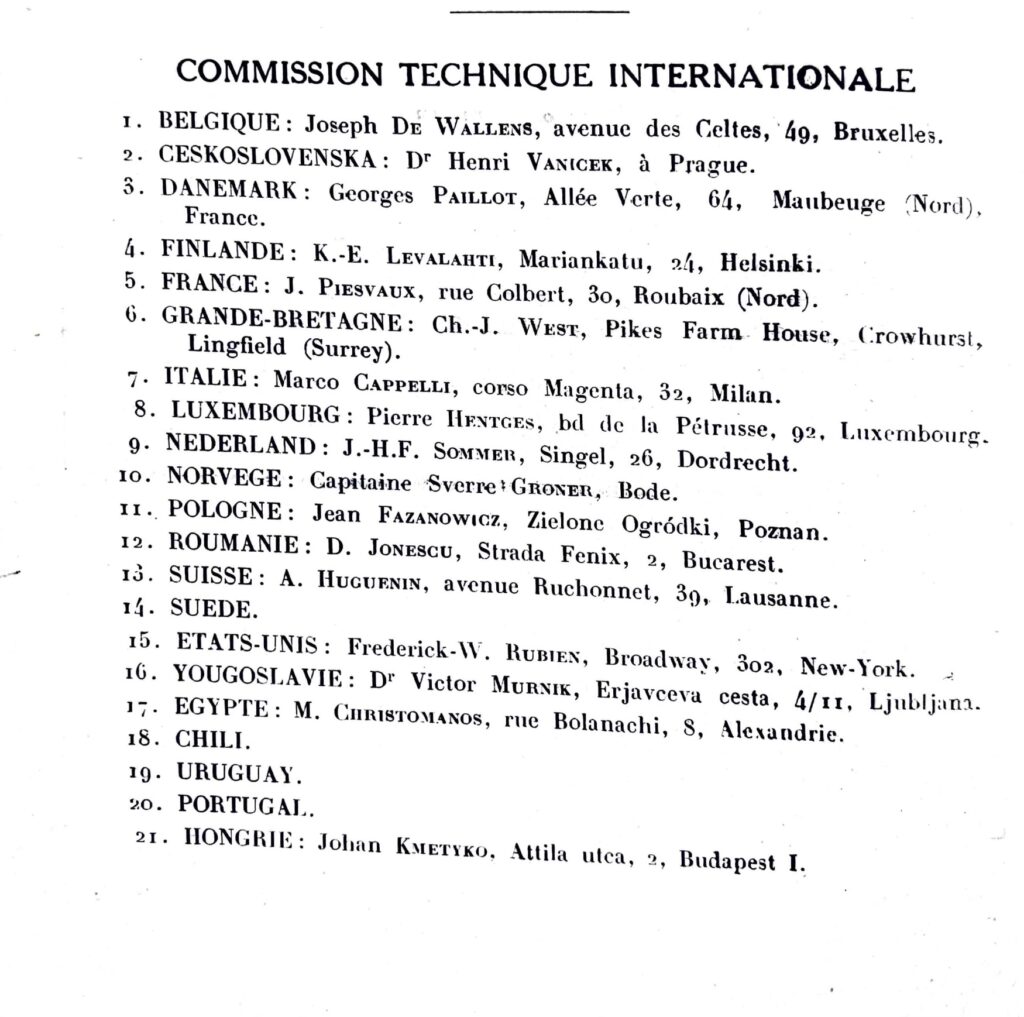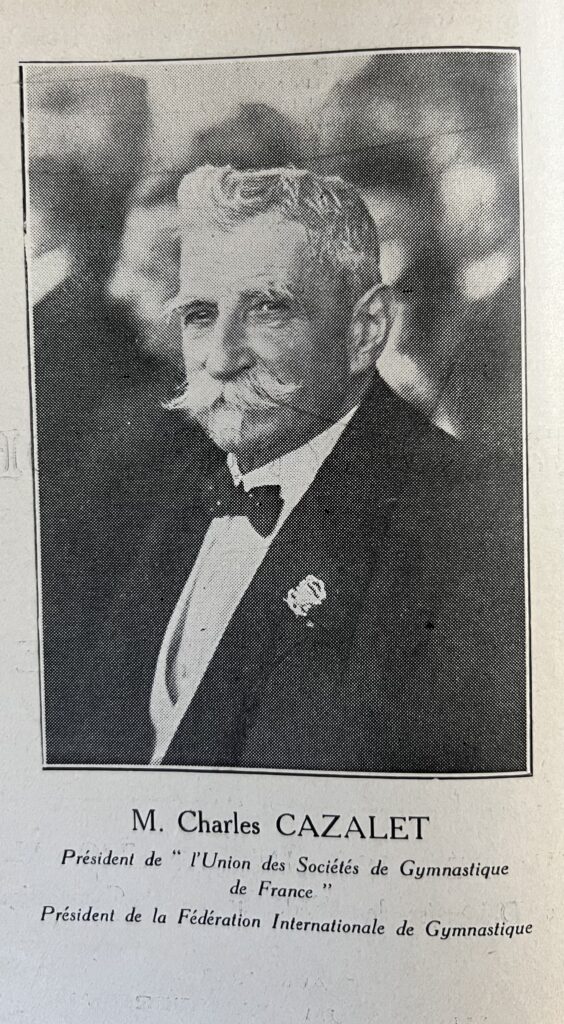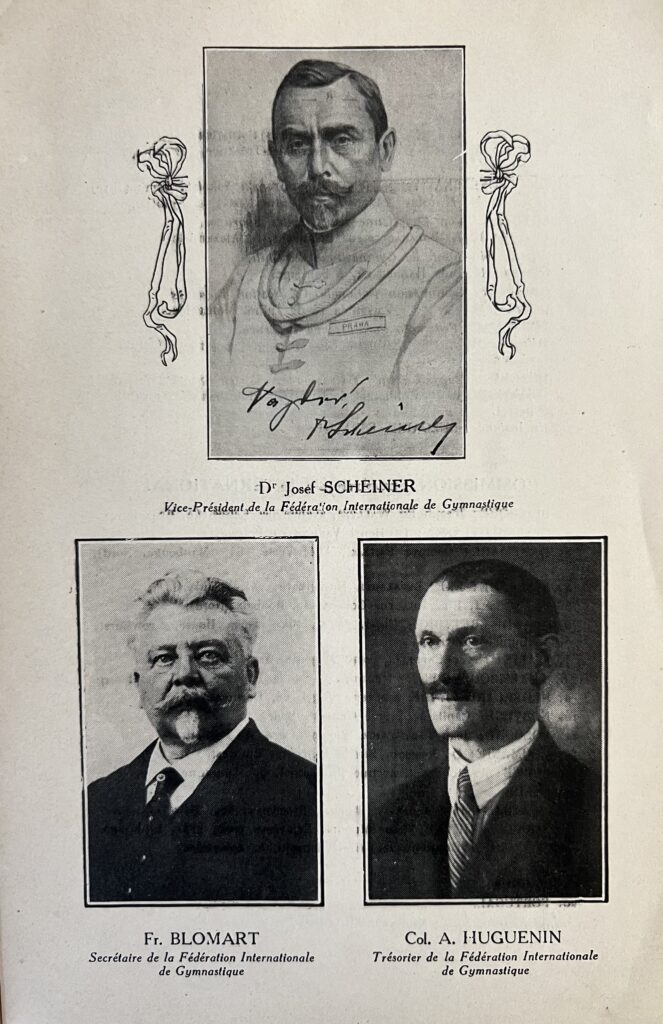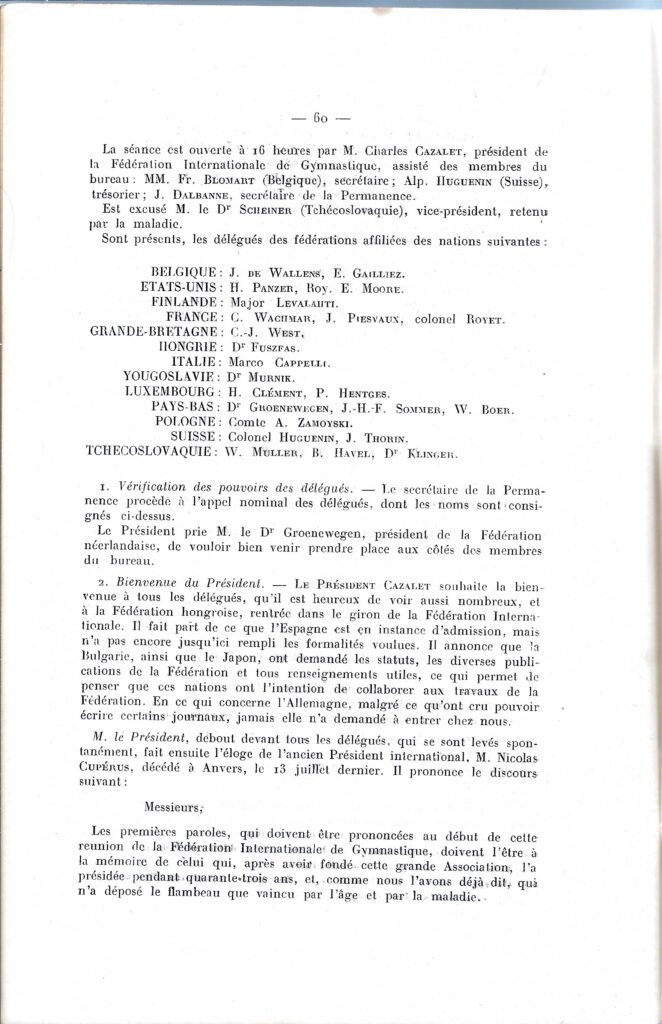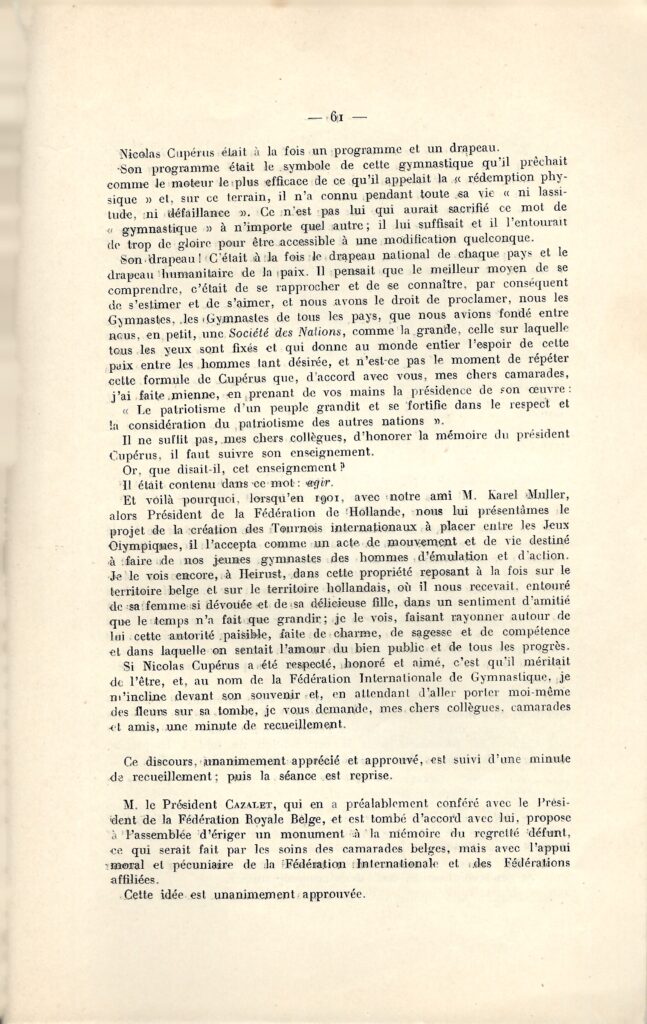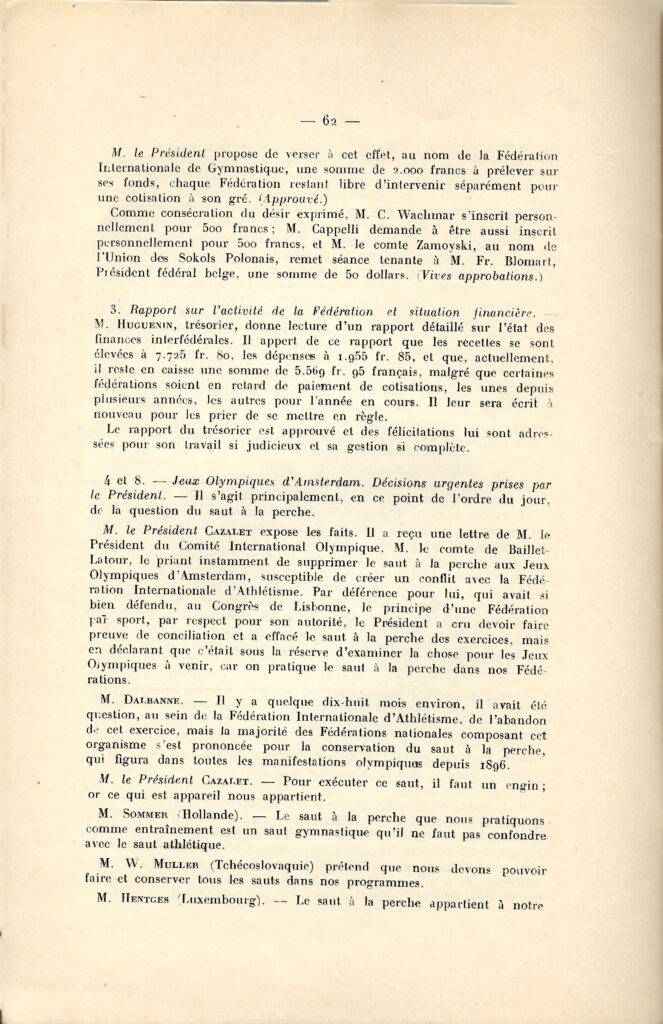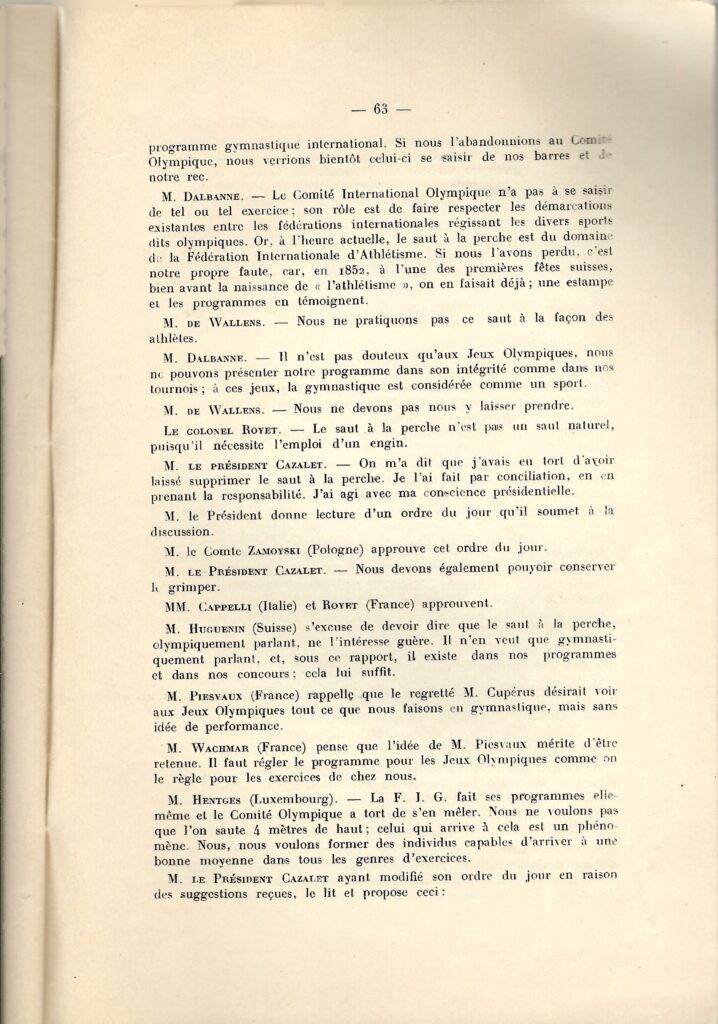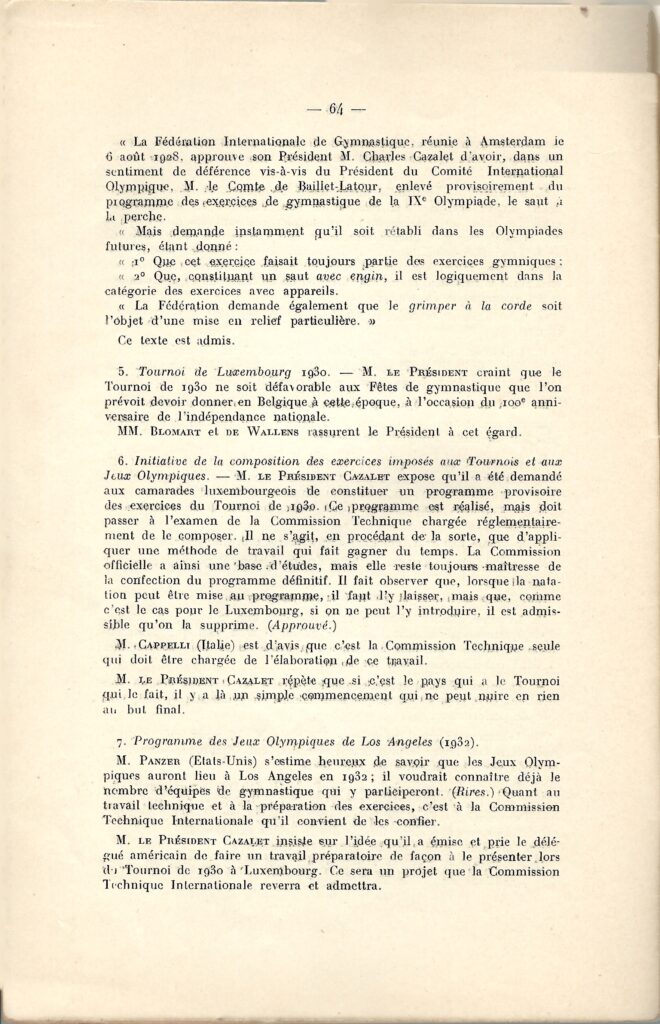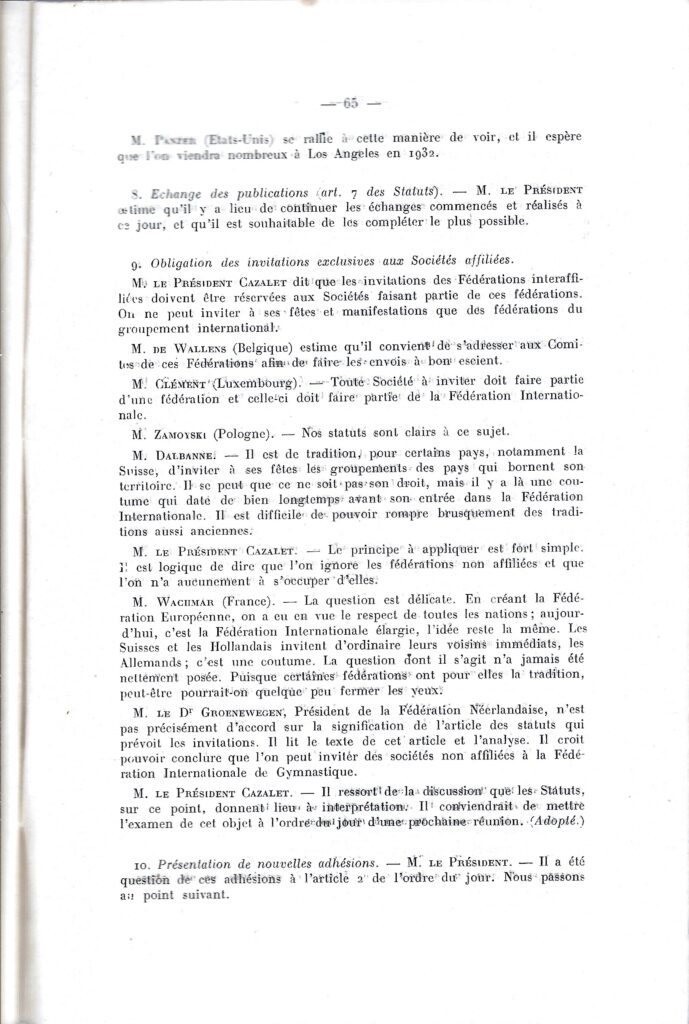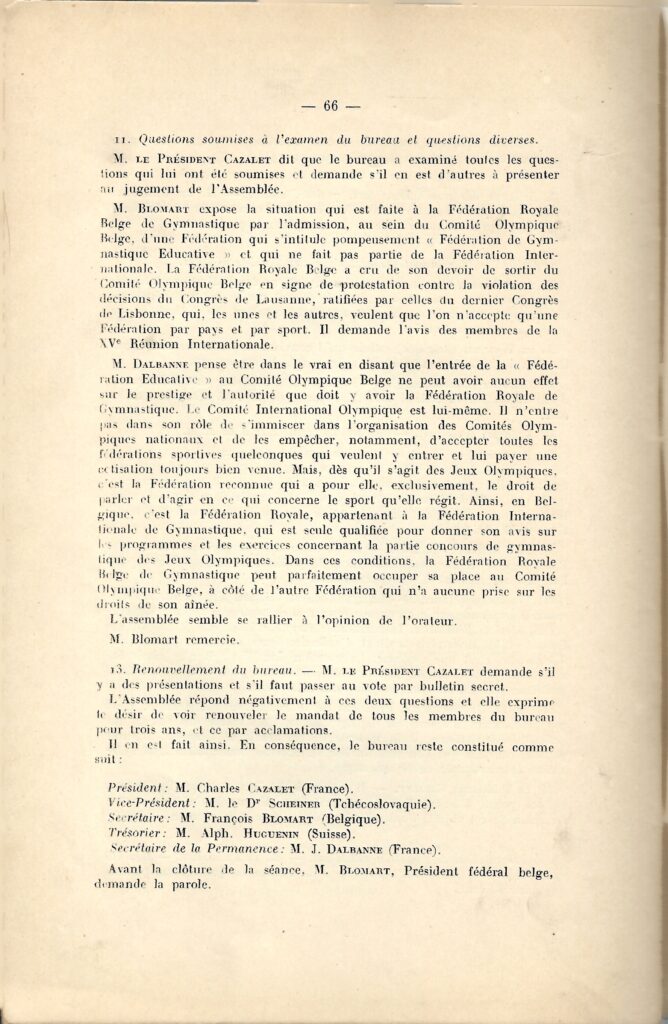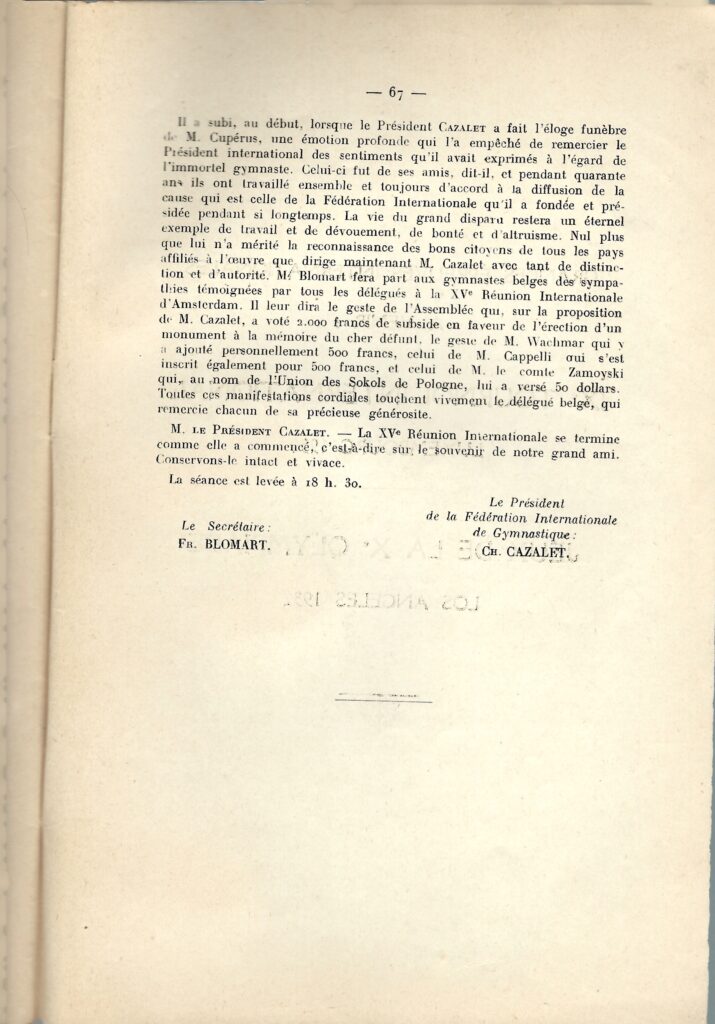In 1928, the 15th FIG Congress took place on August 6 in Amsterdam. It was the first meeting of the delegates after the death of Nicolas J. Cupérus, the man who led the FIG for 43 years.
The minutes are fascinating because they show the struggle between the International Olympic Committee (IOC) and the International Gymnastics Federation (FIG) to define the sport of gymnastics.
Is pole vault a gymnastics event or an athletics event?
In the view of the FIG, it was a gymnastics event, especially since it required the use of apparatus. (It was also part of Jahn’s seminal text, Die Deutsche Turnkunst, though that point did not come up in conversations.) But the IOC didn’t share the FIG’s view.
*Cue dramatic music.*
Reminder: Track and field events like pole vault were part of the World Championships (originally called the International Tournament) until 1950. Here’s a full list of events during the major men’s gymnastics competitions from 1896 until 1950.
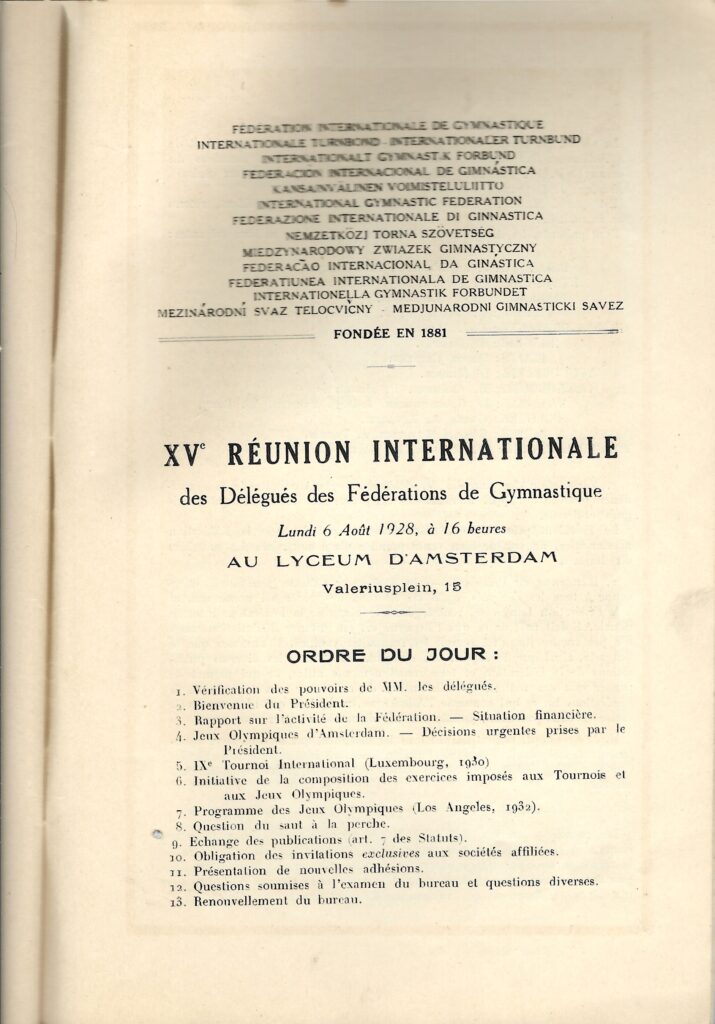
Note: You can find a list of member federations and members of the Technical Committee below. And to give you faces to match some of the names in the minutes below, here are photos of the FIG leadership at the time.
15th International Meeting of Delegates of Gymnastics Federations
Monday, August 6, 1928, at 4 p.m.
At the Amsterdam Lyceum
Valeriusplein, 15
Agenda:
[Note: You can click on the numbers to jump to a section.]
1. Verification of the credentials of the delegates.
2. Welcome from the President.
3. Report on the activity of the Federation. – Financial situation.
4. Olympic Games in Amsterdam. — Urgent decisions taken by the President.
5. IX International Tournament (Luxembourg, 1930)
6. Initiative of the composition of compulsory exercises at Tournaments and Olympic Games.
7. Program of the Olympic Games (Los Angeles, 1932).
8. Question of pole vault.
9. Exchange of publications (art. 7 of the Statutes).
10. Obligation of exclusive invitations to affiliates.
11. Introducing new memberships.
12. Matters for Bureau consideration and miscellaneous matters.
13. Renewal of office.
The meeting was opened at 4 p.m. by Mr. Charles Cazalet, president of the International Gymnastics Federation, assisted by the members of the bureau: Mr. Fr. Blomart (Belgium), secretary; Mr. Alp. Huguenin (Switzerland), treasurer; Mr. J. Dalbanne, permanent secretary.
Mr. Dr. Scheiner (Czechoslovakia), the vice-president, hampered by illness, is excused.
Present are the delegates of the affiliated federations of the following nations:
BELGIUM: J. de Wallens, E. Gailliez.
UNITED STATES: H. Panzer, Roy E. Moore.
FINLAND: Major Levalahti
FRANCE: C. Wachmar, J. Piesvaux, Colonel Royet
GREAT BRITAIN: C. J. West.
HUNGARY: Dr. Fuszfas.
ITALY: Marco Cappelli.
YUGOSLAVIA: Dr. Murnik.
LUXEMBOURG: H. Clement, P. Hentges.
NETHERLANDS: Dr. Groenewegen, J. H. F. Sommer, W. Boer.
POLAND: Count A. Zamoyski.
SWITZERLAND: Colonel Huguenin, J. Thorin.
CZECHOSLOVAKIA: W. Müller, B. Havel; Dr. Klinger.
1. Verification of the credentials of the delegates. The Permanent Secretary proceeds to the roll call of the delegates, whose names are recorded above.
The President asks Dr. Groenewegen, President of the Dutch Federation, to come and take his place alongside the members of the Bureau.
2. Welcome from the President. — President Cazalet welcomes all the delegates — he is happy to see so many — and the Hungarian Federation, which has returned to the fold of the International Federation. He reports that Spain is in the process of admission, but has not yet completed the required formalities. He announced that Bulgaria, as well as Japan, had requested the statutes, the various publications of the Federation, and all useful information, which led to the belief that these nations intended to collaborate in the work of the Federation. As far as Germany is concerned, despite what certain newspapers believed they could write, Germany never asked to enter our organization.
Mr. President, standing in front of all the delegates, who rose spontaneously, then praised the former International President, Mr. Nicolas Cupérus, who died in Antwerp on July 13th. He delivers the following speech:
Gentlemen:
The first words, which must be spoken at the beginning of this meeting of the International Gymnastics Federation, must be in memory of him who, after having founded this great Association, presided over it for forty-three years, and, as we have already said, who did not lay down the torch until he was overcome by age and illness.
Nicolas Cupérus was both a program and a flag.
His program was the symbol of this gymnastics that he preached as the most effective motor of what he called “physical redemption” and, in this field, he experienced throughout his life “neither weariness nor weakness.” He would not have surrendered the word “gymnastics” to anyone else; it was enough for him, and he surrounded it with too much glory to be accessible to any modification whatsoever.
His flag! It was both the national flag of each country and the humanitarian flag of peace. He thought that the best way to understand each other was to get closer and to know each other, and therefore to esteem and love each other, and we have the right to proclaim, we the Gymnasts, the Gymnasts of all countries, that we had founded among ourselves, in a small way, a League of Nations, like the great one, on which all eyes are fixed and which gives the whole world the hope of this peace among men that is so desired, and is this not the time to repeat this formula of Cuperus that, in agreement with you, my dear comrades, I have made mine, taking from your hands the presidency of his work:
“The patriotism of a people grows and strengthens in respect and consideration for the patriotism of other nations.”
It is not enough, my dear colleagues, to honor the memory of President Cupérus, we must follow his teaching.
Now, what was he saying, this teaching?
It was contained in this word: to act.
And that is why, when in 1901, with our friend Mr. Karel Muller, then President of the Dutch Federation, we presented to him the project of creating International Tournaments to be placed between the Olympic Games, he accepted it as an act of movement and life intended to make our young gymnasts men of emulation and action. I still see him, in Heirust, in this property resting both on Belgian territory and on Dutch territory, where he welcomed us, surrounded by his devoted wife and his sweet daughter, in a feeling of friendship that has only grown with time; I see radiating around him that peaceful authority, made up of charm, wisdom, and competence, and in which one felt the love of the public good and of all progress.
[Note: Cupérus was initially reluctant to create the International Tournaments.]
If Nicolas Cupérus has been respected, honored, and loved, it is because he deserved to be so, and, in the name of the International Gymnastics Federation, I bow to his memory and, while waiting to place flowers on his grave, I ask you, my dear colleagues, comrades, and friends, for a minute of contemplation.
This speech, unanimously appreciated and approved, is followed by a minute of meditation; then the meeting is resumed.
Mr. President Cazalet, who has previously conferred with the President of the Royal Belgian Federation, and has come to an agreement with him, proposes to the assembly to erect a monument to the memory of the late deceased, which would be done by the care of the Belgian comrades, but with the moral and financial support of the International Federation and the affiliated Federations.
This idea is unanimously approved.
The President proposes to pay for this purpose, on behalf of the International Gymnastics Federation, a sum of 2,000 francs to be deducted from its funds, each Federation remaining free to intervene separately for a contribution as it sees fit. (Approved.)
As confirmation of the wish expressed, Mr. C. Wachmar registered personally for 500 francs: Mr. Cappelli asked to be also registered personally for 500 francs, and Count Zamoyski, in the name of the Union of Polish Sokols, immediately handed over to Mr. Fr. Blomart, Belgian Federal President, a sum of 50 dollars. (Hearty approvals.)
3. Report on the activity of the Federation and financial situation.
Mr. Huguenin, treasurer, read a detailed report on the state of interfederal finances. It appears from this report that the receipts amounted to 7,725.80 fr., expenses at 1,955.85 fr., and that, at present, there remains in cash a sum of 5,569.95 French francs, despite the fact that some federations are late in paying dues, some for several years, others for the current year. It will be written to them again to ask them to put themselves in order.
The treasurer’s report is approved and congratulations are addressed to him for his judicious work and his complete management.
4 and 8. — Olympic Games in Amsterdam. Urgent decisions taken by the President. — This is mainly the question of pole vault.
Mr. President Cazalet lays out the facts. He received a letter from the President of the International Olympic Committee, the Count de Baillet-Latour, urging him to abolish pole vaulting at the Olympic Games in Amsterdam, which could create a conflict with the International Federation of Athletics. Out of deference to him, who had defended so well, at the Lisbon Congress, the principle of one Federation per sport, out of respect for his authority, the President thought he had to show conciliation and removed pole vault from the exercises, but stating that it was subject to examining the matter for the upcoming Olympic Games, because pole vaulting is practiced in our Federations.
Mr. Dalbanne. — About eighteen months ago, there was talk within the International Athletics Federation of abandoning this exercise, but the majority of the national Federations that make up this body have come out in favor of retaining pole vault, which has featured in all Olympic events since 1896.
Mr. President Cazalet. — To perform this jump, you need an apparatus; but the apparatus events belong to us.
Mr. Sommer (Holland). — The pole vault that we practice as training is a gymnastic vault which should not be confused with the athletic vault.
Mr. W. Müller (Czechoslovakia) claims that we must be able to make and keep all the jumps in our programs.
Mr. Hentges (Luxembourg). — The pole vault belongs to our international gymnastics program. If we abandoned it to the Olympic Committee, we would soon see them seize our parallel bars and our high bar.
Mr Dalbane. — The International Olympic Committee does not have to take up this or that exercise; its role is to enforce the existing demarcations between the international federations governing the various so-called Olympic sports. However, at present, the pole vault is the domain of the International Athletics Federation. If we lost it, it’s our own fault, because, in 1852, at one of the first Swiss festivals, long before the birth of “athletics,” we were already doing it; a stamp and the programs bear witness to this.
Mr. de Wallens. — We don’t do this vault the way athletes [i.e. track and field athletes] do.
M. Dalbanne — There is no doubt that at the Olympic Games we cannot present our program in its entirety as in our tournaments; at these games, gymnastics is considered a sport.
Mr. de Wallens. — We must not let ourselves be taken in by it.
Colonel Royet. — The pole vault is not a natural jump, since it requires the use of an apparatus.
Mr. President Cazalet. — I was told that I was wrong to have allowed the pole vault to be suppressed. I did it by conciliation, taking responsibility for it. I acted with my presidential conscience.
The President reads out an agenda which he submits for discussion.
Count Zamoyski (Poland) approves this agenda.
Mr. President Cazalet. — We must also be able to keep the rope climb.
Mr. Cappelli (Italy) and Mr. Royet (France) agree.
Mr. Huguenin (Switzerland) apologizes for having to say that the pole vault, Olympically speaking, does not interest him much. He only wants it gymnastically speaking, and, in this respect, it exists in our programs and in our competitions: that is enough for him.
Mr. Piesvaux (France) recalls that the late Mr. Cupérus wanted to see everything we do in gymnastics at the Olympic Games, but without any idea of performance.
Mr. Wachmar (France) thinks that Mr. Piesvaux’s idea deserves to be retained. We must regulate the program for the Olympic Games as we regulate it for the exercises at home.
Mr. Hentges (Luxembourg). — The FIG makes its own programs and the Olympic Committee is wrong to interfere. We don’t want to be vaulting 4 meters high; whoever achieves this is a phenomenon. We want to train individuals capable of achieving a good average in all types of exercises.
Mr. President Cazalet having modified his agenda because of the suggestions received, reads it and proposes the following:
“The International Gymnastics Federation, meeting in Amsterdam on August 6, 1928, approves that its President Mr. Charles Cazalet to have, in a sense of deference to the President of the International Olympic Committee, Mr. Count de Baillet-Latour, temporarily removed pole vaulting from the gymnastics exercise program at the 9th Olympiad.
“But urges that it be reinstated in future Olympiads, given:
“1st. That this exercise was always part of the gymnastic exercises;
“2nd. That, constituting a jump with apparatus, it is logically in the category of exercises with apparatus.
“The Federation also asks that rope climbing be the subject of special emphasis.”
This text is accepted.
[Reminder: This is not the only time the FIG has had to modify its Olympic program to fit the needs of the IOC. For example, it canceled the ensemble routines in women’s gymnastics in 1957.]
5. 1930 Luxembourg Tournament. — The President fears that the 1930 Tournament will be unfavorable to the Gymnastic Festivals which are planned to be held in Belgium at that time, on the occasion of the 100th anniversary of the national independence.
Mr. Blomart and Mr. de Wallens reassured the President in this respect.
6. Initiative of the composition of compulsory exercises at Tournaments and Olympic Games. — Mr. President Cazalet explains that the Luxembourg comrades have been asked to draw up a provisional program of exercises for the 1930 Tournament. This program has been completed, but must be examined by the Technical Committee responsible for composing it. It is only a question of applying a working method that saves time. The Official Committee thus has a basis for studies, but it always remains in charge of drawing up the final program. He pointed out that, when swimming could be included in the program, it should be left there, but that, as is the case for Luxembourg, if it could not be introduced there, it was permissible to remove it. (Approved.)
Mr. Cappelli (Italy) is of the opinion that it is the Technical Committee alone that should be responsible for the elaboration of this work.
Mr. President Cazalet repeats that, if the country that has the Tournament does it, there is a simple beginning, which can in no way harm the final goal.
7. Program of the Olympic Games in Los Angeles (1932).
Mr. Panzer (United States) considers himself happy to know that the Olympic Games will be held in Los Angeles in 1932; he would like to know already the number of gymnastics teams that will participate. (Laughter.) As for the technical work and the preparation of the exercises, it is up to the International Technical Committee to confer them.
Mr. President Cazalet insists on the idea he has put forward and asks the American delegate to do some preparatory work so as to present it at the 1930 Tournament in Luxembourg. This will be a project that the International Technical Committee will review and approve.
Mr. Panzer (United States) agrees with this view, and he hopes that many people will come to Los Angeles in 1932.
8. Exchange of publications (art. 7 of the Statutes). — The President considers that it is necessary to continue the exchanges begun and carried out to date, and that it is desirable to complete them as much as possible.
9. Obligation of exclusive invitations to Affiliates.
Mr. President Cazalet said that the invitations of the Interaffiliated Federations must be reserved for the Societies forming part of these federations. Only federations of the international grouping can be invited to its festivals and demonstrations.
[Backstory: The federations affiliated with the FIG were supposed to invite only other affiliated federations to their local competitions. So, for example, the Germans were not to be invited, given that the Germans were not affiliated with the FIG.]
Mr. de Wallens (Belgium) considers that it is advisable to approach the Committees of these Federations in order to make the invitations wisely.
Mr. Clement (Luxembourg). — Any Society to be invited must be part of a federation and this one must be part of the International Federation.
Mr. Zamoyski (Poland). — Our statutes are clear on this subject.
Mr. Dalbanne — It is a tradition for certain countries, notably Switzerland, to invite to its festivals groups of countries that border its territory. It may not be its right, but there is a custom that dates back a long time, before its entry into the International Federation. It is difficult to be able to abruptly break such ancient traditions.
Mr. President Cazalet. — The principle to be applied is very simple. It is logical to say that the unaffiliated federations are ignored and have nothing to do with them.
Mr. Wachmar (France). — The question is delicate. In creating the European Federation, we had in view the respect of all nations; today, though it is the enlarged International Federation, the idea remains the same. The Swiss and the Dutch usually invite their immediate neighbors, the Germans; it is a custom. The question in question has never been clearly posed. Since some federations have tradition on their side, perhaps we could turn a blind eye.
[Reminder: Originally, the FIG was not an international organization but rather a European one. Its original name was the Bureau des Fédérations Européennes de Gymnastique (Bureau of European Gymnastics Federations).]
Mr. Dr. Groenewegen, President of the Dutch Federation, does not precisely agree on the meaning of the article of the statutes that discusses invitations. He reads the text of this article and analyzes it. He believed he could conclude that it was possible to invite societies not affiliated to the International Gymnastics Federation.
Mr. President Cazalet. — It emerged from the discussion that the Statutes, on this point, give rise to interpretation. It would be appropriate to put the examination of this subject on the agenda of a future meeting. (Adopted.)
[Note: The topic of invitations to competitions and festivals was already a topic at the 1896 Congress.]
10. Introducing New Memberships. — Mr. President. — These memberships have been discussed under item 2 of the agenda. We move on to the next point.
11. Matters for Bureau Consideration and Miscellaneous Matters.
Mr. President Cazalet said that the Bureau had examined all the questions submitted to it and asked if there were any others to submit to the judgment of the Assembly.
Mr. Blomart explains the situation which is created for the Royal Belgian Gymnastics Federation by the admission, within the Belgian Olympic Committee, of a Federation that pompously calls itself “Federation of Educational Gymnastics” and that is not part of the International Federation. The Royal Belgian Federation believed it was its duty to leave the Belgian Olympic Committee as a sign of protest against the violation of the decisions of the Congress of Lausanne, ratified by those of the last Congress of Lisbon, each of which, want to accept only one Federation per country and per sport. The opinion of the members of the 15th International Meeting is requested.
Mr. Dalbanne thinks he is right in saying that the entry of the “Educational Federation” to the Belgian Olympic Committee cannot have any effect on the prestige and authority that the Royal Gymnastics Federation must have. The International Olympic Committee is itself. It is not its role to interfere in the organization of the National Olympic Committees and to prevent them, in particular, from accepting all the sports federations which want to enter and pay a subscription which is always welcome. But when it comes to the Olympic Games, it is the recognized Federation that has the exclusive right to speak and act with respect to the sport it governs. Thus, in Belgium, it is the Royal Federation, belonging to the International Gymnastics Federation, that is only qualified to give its opinion on the programs and exercises concerning the gymnastics competition part of the Olympic Games. In these conditions, the Belgian Royal Gymnastics Federation can perfectly occupy its place in the Belgian Olympic Committee, next to the other Federation which has no control over the rights of its elder.
The assembly seemed to agree with the speaker’s opinion.
Mr. Blomart expresses thanks.
13. Renewal of office. — President Cazalet asks if there are any presentations and if we should vote by secret ballot.
The Assembly responds negatively to these two questions and expresses the desire to see the mandate of all the members of the office renewed for three years, and this by acclamation.
It is done so. Consequently, the office remains constituted as follows:
President: Mr. Charles Cazalet (France).
Vice-President: Dr. Scheiner (Czechoslovakia).
Secretary: Mr. François Blomart (Belgium).
Treasurer: Mr. Alph. Huguenin (Switzerland).
Permanent Secretary: Mr. J. Dalbanne (France).
Before the closing of the session, Mr. Blomart, Belgian Federal President, asks to speak.
He suffered, in the beginning, when President Cazalet gave the eulogy of Mr. Cupérus, a deep emotion that prevented him from thanking the International President for the feelings he had expressed with regard to the immortal gymnast. The latter was one of his friends, he says, and for forty years they worked together always in agreement to spread the cause which is that of the International Federation which he founded and chaired for so long. The life of the deceased will remain an eternal example of work and dedication, kindness and altruism. No one more than he deserved the recognition of the good citizens of all the countries affiliated with the work that Mr. Cazalet now directs with so much distinction and authority. Mr. Blomart will inform the Belgian gymnasts of the sympathy shown by all the delegates to the 15th International Meeting in Amsterdam. He will tell them the gesture of the Assembly which, on the proposal of Mr. Cazalet, voted 2,000 francs of subsidy in favor of the erection of a monument to the memory of the dear deceased, the gesture of Mr. Wachmar who personally added 500 francs, that of Mr. Cappelli who also registered for 500 francs, and that of Mr. Count Zamoyski, who, in the name of the Union of Sokols of Poland, paid 50 dollars. All these cordial expressions deeply touched the Belgian delegate, who thanked everyone for their precious generosity.
Mr. President Cazalet. — The 15th International Meeting ends as it began, that is to say on the memory of our great friend. Let’s keep it intact and alive.
The meeting adjourned at 6:30 pm.
The President of the International Gymnastics Federation:
Ch. Cazalet
The Secretary:
Fr. Blomart
Appendix: Membership
The members of the FIG at the time
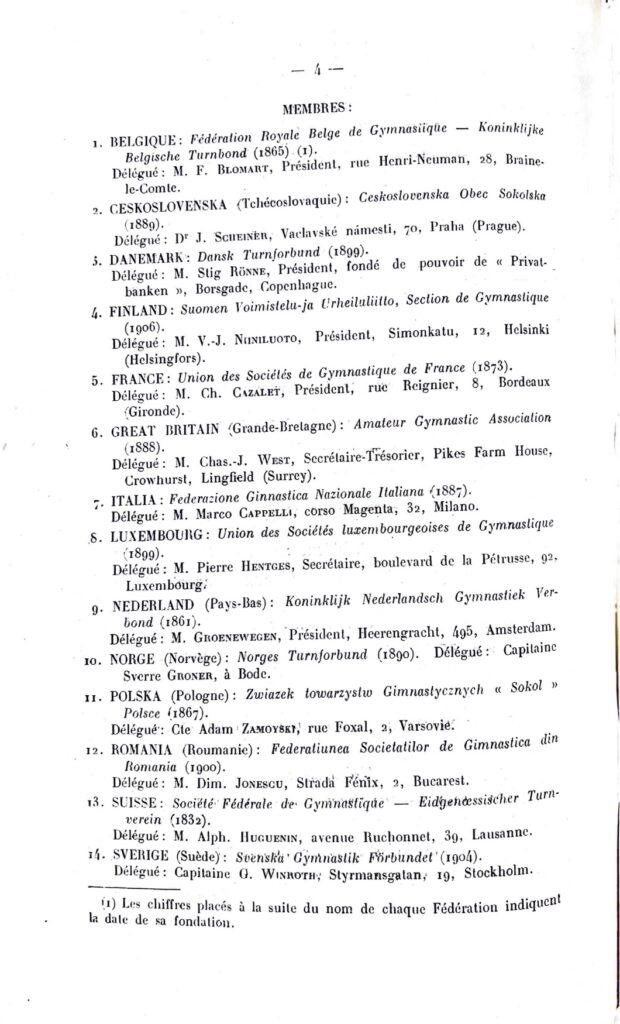
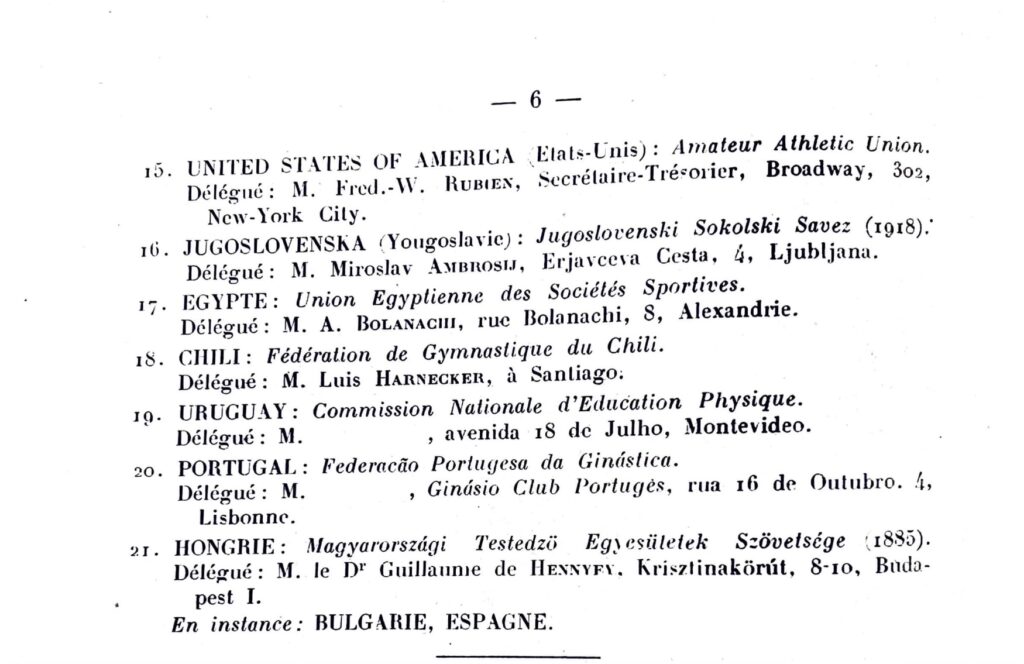
The members of the International Technical Committee
